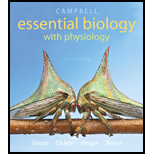
Campbell Essential Biology with Physiology (5th Edition)
5th Edition
ISBN: 9780321967671
Author: Eric J. Simon, Jean L. Dickey, Jane B. Reece, Kelly A. Hogan
Publisher: PEARSON
expand_more
expand_more
format_list_bulleted
Concept explainers
Textbook Question
Chapter 14, Problem 4SQ
Why is a small, isolated population more likely to undergo
Expert Solution & Answer
Want to see the full answer?
Check out a sample textbook solution
Students have asked these similar questions
why are reproductive barriers essential in speciation?
Can speciation occur without complete physical separation of populations?
Why does geographical isolation lead to speciation?
Chapter 14 Solutions
Campbell Essential Biology with Physiology (5th Edition)
Additional Science Textbook Solutions
Find more solutions based on key concepts
Describe the evolution of mammals, tracing their synapsid lineage from early amniote ancestors to true mammals....
LooseLeaf for Integrated Principles of Zoology
The appearance of glucose in the urine a. occurs normally. b. indicates the presence of kidney disease. c. occu...
Human Physiology
A student moving out of a dormitory crouches in correct fashion to lift a heavy box of books. What prime movers...
HUMAN ANATOMY
Relative thickness of the myocardium in different chambers; the functional significance of those differences; a...
Anatomy & Physiology: The Unity of Form and Function
Why are mutants used as test organisms in the Ames test?
Laboratory Experiments in Microbiology (12th Edition) (What's New in Microbiology)
How does trandlation differ from transcription?
Microbiology: Principles and Explorations
Knowledge Booster
Learn more about
Need a deep-dive on the concept behind this application? Look no further. Learn more about this topic, biology and related others by exploring similar questions and additional content below.Similar questions
- Over time, enough genetic variations can develop within a population to cause it to undergo speciation. Identify the various mechanisms that will prevent different species from being able to reproduce successfully. Which of these mechanisms is the most influential in keeping species sperate?arrow_forwardHow, then, can speciation occur if gene flow exists?arrow_forwardHow do reproductive isolating mechanisms lead to speciation?arrow_forward
- How can speciation occur sympatrically?arrow_forwardWhat is Allopatric speciation? A) When a population is separated from the main group by a barrier and becomes a new species B) When a population mutates into a new species C) When a population develops into a new species without any physical barriers to isolate themarrow_forwardIn what theory of speciation do new species emerge within the geographic range of their ancestors?arrow_forward
- Which of the following statements about sympatric speciation is correct? It is a process through which two populations can diverge and develop reproductive isolation while in two different geographic area. It is the most common mechanism for populations to form independent species. Postzygotic isolation is the main form of reproductive isolation for the sympatric speciation process. Genetic isolation through large scale chromosomal mutations, such as chromosome inversion or polyploidy, are more likely contributing to sympatric speciation. None of the abovearrow_forwardIf a geographic barrier is removed and the two reunited populations intermingle and breed, what attributes must the offspring have in order for the two populations, according to the biological species concept, to be considered still the same species?arrow_forwardThere is a fish species that lives in a lake. As the fish population grows, competition for food increases and a group of fish locates a new food source at a different depth in the lake. Over time, two populations with distinct morphologies that allow them to eat various food sources begins to occur in the lake. Which type of speciation (allopatric or sympatric) will mostly likely occur? Why?arrow_forward
- What is Sympatric speciation? A) When a population is separated from the main group by a barrier and becomes a new species B) When a population mutates into a new species C) When a population develops into a new species without any physical barriers to isolate themarrow_forwardCompare the forms of speciation that are slow to those that occur more rapidly. Make a list of the slow and fast forms. With regard to mechanisms of genetic change, what features do slow and rapid speciation have in common? What features are different?arrow_forwardHow come dispersal is still allopatric speciation? I was under the impression that a new geographical barrier would have to develop and separate a once-uniform species. Also, what's the difference between vicariance and allopatric speciation?arrow_forward
arrow_back_ios
SEE MORE QUESTIONS
arrow_forward_ios
Recommended textbooks for you
 Biology (MindTap Course List)BiologyISBN:9781337392938Author:Eldra Solomon, Charles Martin, Diana W. Martin, Linda R. BergPublisher:Cengage Learning
Biology (MindTap Course List)BiologyISBN:9781337392938Author:Eldra Solomon, Charles Martin, Diana W. Martin, Linda R. BergPublisher:Cengage Learning

Biology (MindTap Course List)
Biology
ISBN:9781337392938
Author:Eldra Solomon, Charles Martin, Diana W. Martin, Linda R. Berg
Publisher:Cengage Learning
Mechanisms of Genetic Change or Evolution; Author: Scientist Cindy;https://www.youtube.com/watch?v=5FE8WvGzS4Q;License: Standard Youtube License